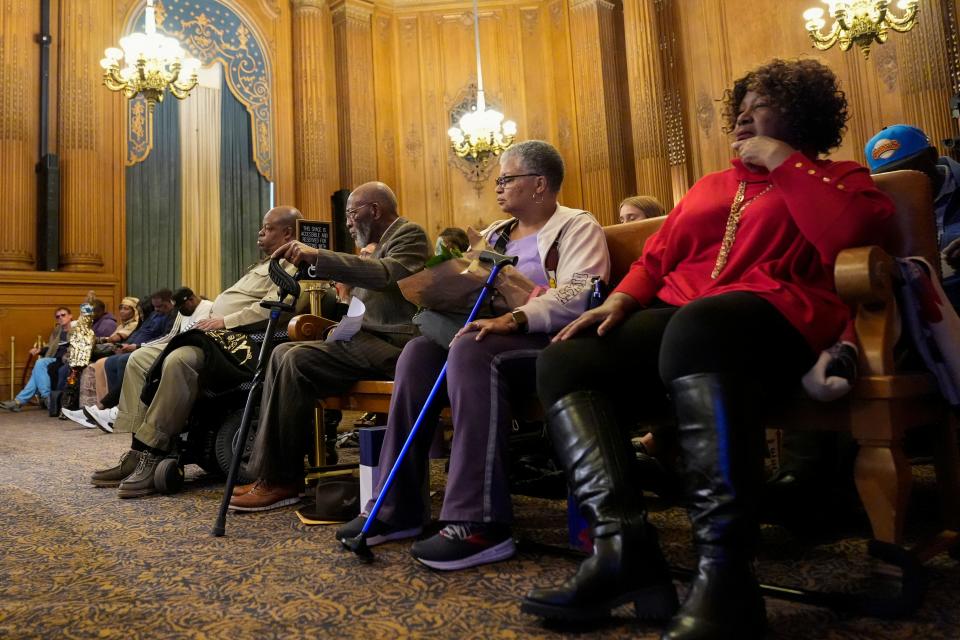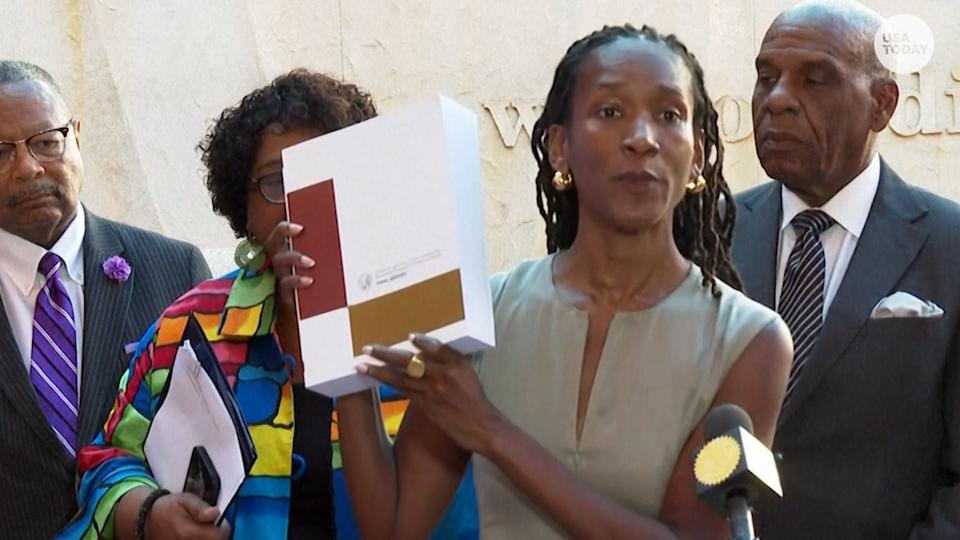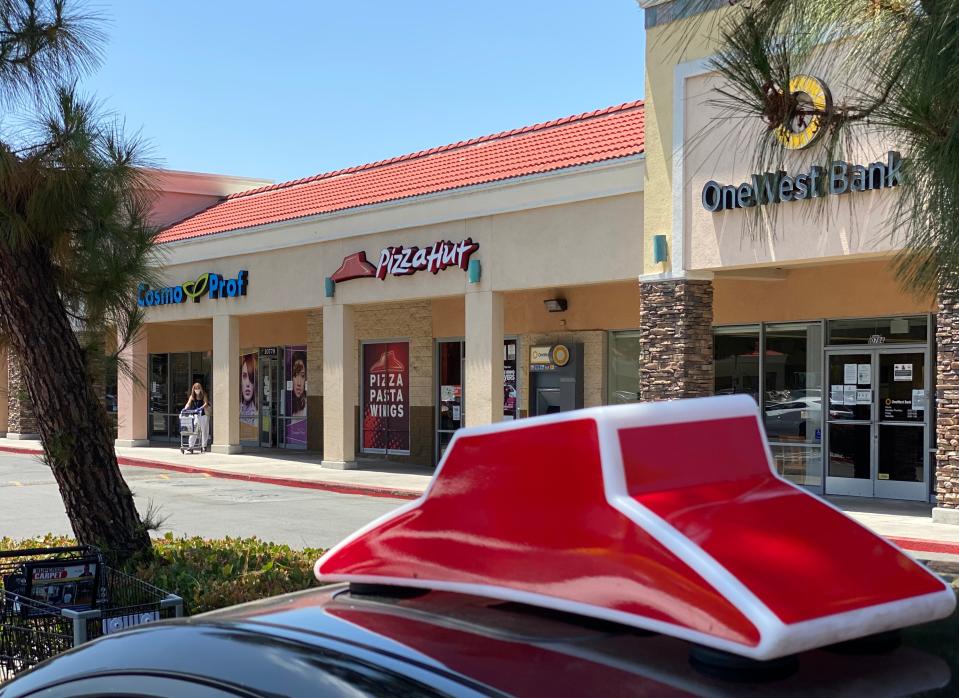Reparations experts say San Francisco’s apology to black residents is a start, but not enough
Experts say if this week’s apology by San Francisco leaders to the city’s Black residents for decades of discrimination is going to be a first step toward reparations, the steps that follow must be carefully considered for the apology to prove meaningful.
On Tuesday, the 11-member San Francisco Board of Supervisors unanimously passed a resolution apologizing “to all African Americans and their descendants who came to San Francisco and were victims of systemic and structural discrimination, institutional racism, targeted acts of violence, and atrocities.”
Reparations scholar Roy Brooks, a professor of law at the University of San Diego and editor of the 1999 book “When Sorry Isn't Enough: The Controversy Over Apologies and Reparations for Human Injustice,” said an apology alone was not sufficient.
“Reparations are the redemptive act that makes the rhetoric of an apology meaningful," Brooks said. "You can’t just say you’re sorry and walk away.”

Though the move makes San Francisco among just a few U.S. municipalities to declare intent to make amends for past racist policies, the resolution is the only action taken thus far from more than 100 recommendations submitted by the city’s reparations advisory committee.
Among the committee’s other proposals: a lump-sum payment of $5 million to every eligible Black adult and annual supplements of nearly $100,000 for low-income households to rectify San Francisco’s racial wealth gap.
Exactly where the enormous amount of money would come from remains unclear. The Associated Press reported last year that the reparations as proposed could cost California more than $800 billion. That's more than 2½ times California's $300 billion annual budget.
Apology 'an important step' ― or just rhetoric?
Policies that hindered African American families’ ability to accumulate generational wealth likely drove the dwindling of San Francisco’s Black population to its current figure of 46,000, just 5.4% of the overall population of 850,000 and significantly below the national percentage of 14.4.
African Americans comprise 38% of the homeless population in San Francisco, one of the world's most expensive cities in which to live. The median yearly income for a Black household in San Francisco is $64,000, less than half the city’s overall median of nearly $137,000, according to figures from the Census Bureau and Lending Tree. According to a report by the San Francisco Human Rights Commission, Black people have the highest mortality rate among nine of San Francisco’s top 10 causes of death.
Tuesday’s resolution encourages the city to commit “to making substantial ongoing, systemic, and programmatic investments” in African American communities.
“We have much more work to do, but this apology most certainly is an important step,” said supervisor Shamann Walton, the board’s only Black member.
Others, however, have been skeptical that the city will follow through with meaningful action. The Rev. Amos Brown, a former supervisor and a member of the reparations advisory committee, called the apology “cotton candy rhetoric.”

Niambi Carter, an associate professor of public policy, said apologies are usually an important first step in the process of repair.
“If San Francisco is serious, local leadership, as well as the citizens of that city, need to have some honest, tough talks about the road ahead and not give in to the potential for divisiveness that this subject engenders,” Carter said.
Such efforts are being pursued at California's state level as well.
Reparations can be more than monetary
Reparations as a form of justice are globally and even nationally common, Carter said, though they may not always be recognized as such. Consider, she said, the number of judge-focused reality shows driven by the notion of repair.
“Reparation is ultimately about easing conflict,” Carter said. “But to get there requires negotiation of all parties involved, being honest about the conflict and the harms it caused.”
Though people tend to think of reparations as monetary, they can encompasses a range of possibilities, she said. Cities that focus on the former can be hindered from issuing similar apologies, “a necessary precursor to ‘righting’ the harm,” Carter said, as discussions can become embroiled in a mix of emotions ranging from rage to jubilation depending on whether a person is a recipient.
Reparations measures can pursued separately or together, Carter said, whether monetary payments – as with Japanese Americans interned during World War II – or truth and reconciliation, as in South Africa, where a commission was formed to investigate human rights violations perpetrated during apartheid.
They also can take the form of public remembrances, such as Holocaust memorials, or even include mental health counseling, which was among the remedies offered as part of a $5 million reparations package awarded to victims of Chicago police abuse in 2019.
Brooks said that while private universities like Harvard and Georgetown have pledged financial reparative measures, budget constraints challenge public entities to respond concretely to past wrongs. Instead, some municipalities are leaning on rehabilitative reparations that are less costly.
For example, the Chicago suburb of Evanston, Illinois, in 2019 began offering housing assistance to Black residents to atone for generations of property undervaluation by white appraisers that slowed Black families’ efforts to accumulate generational wealth.
“These are not cash payments, which is what most people think about,” Brooks said. “But they’ve actually done something.”
Though such forms of reparations are less effective economically than cash payments, he said, budget challenges can make them more attractive options for government entities to pursue.
Good intentions alone not enough, experts say
Effective reparations, Brooks said, require more than good intentions; rhetoric has to be backed up with tangible actions focusing on those harmed. Otherwise, he said, “the apology doesn’t mean anything. ... It sort of dilutes the whole notion of redress.”

The problem with California state efforts examining reparations, and with any efforts likely to be pursued in San Francisco, Brooks said, “is that they’re all over the damn place, not targeted to victims of atrocity.”
As an example, he noted that one of the measures called for in a California reparations task force report last year was an increase in the minimum wage.
“That’s not a reparation,” Brooks said. “That applies to anybody. Many victims are not minimum-wage earners, so that makes no sense whatsoever.”
Reparations, he said, are by definition asymmetrical, meaning they’re not broadly applied but specially targeted to victims of an atrocity. That’s opposed to what he called “garden-variety social development or civil rights measures” meant to benefit more general groups or communities.
Time – and attention to such distinctions – will show how genuine San Francisco’s efforts are, Brooks said.
“You determine the sincerity of the apology by the weight of the reparations.”
This article originally appeared on USA TODAY: Could San Francisco’s apology to Black residents lead to reparations?

